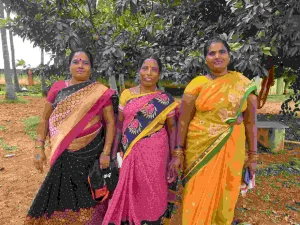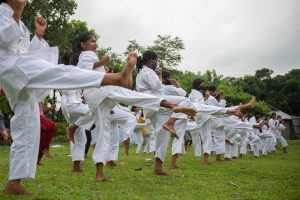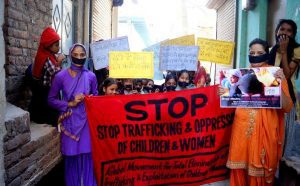Navigating Statelessness: How Laws Fail Bangladeshi Trafficking Survivors In India
- Eisha Hussain
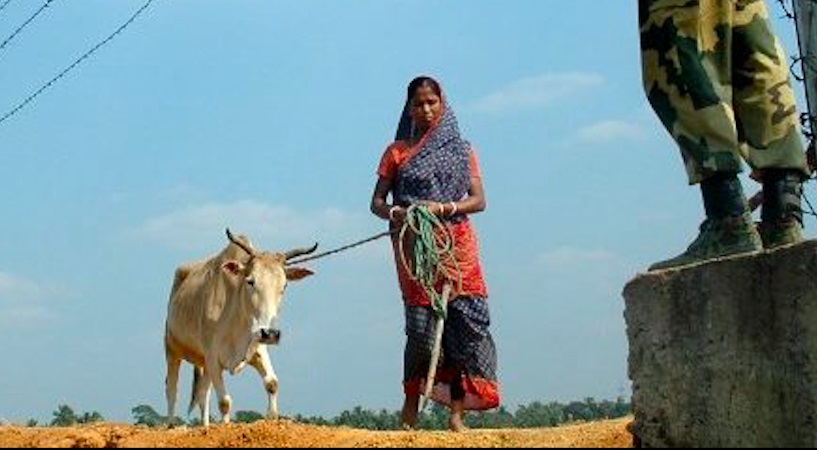
Nafeesa Bibi* (36) was 16 when she left her home in a Bangladesh village and swam across the Ichhamati river into Bongaon in the North 24 Parganas district of West Bengal. A cousin had promised her a well-paying factory job in Kolkata. But once she reached the capital city, her escorts sold her to a brothel owner in Khidirpur, home to a red light area notorious for employing some of the youngest girls in sex work.
After her father passed away, Bangladesh-born Devi’s* family had struggled to make a living from rag picking. Her mother sent her across to West Bengal with a woman who offered to get her a job in Kolkata. Devi was 10 when she was trafficked across the border and sold off to a Khidirpur brothel owner. She was pushed into sex work even before she reached puberty. At the brothel, she was often beaten and never given a share of her earnings.
Both Devi and Bibi tried resisting and escaping the trade, but failed. Each time they tried to run away, they were caught by a customer or a pimp and resold. Devi, who is now 40, and Bibi currently live with their husbands and operate as individual sex workers in Kalighat and Chetla – two of Kolkata’s many red light areas – respectively.
The physical and cultural proximity between West Bengal and Bangladesh allowed the two women to merge into Kolkata’s larger sex work network and remain unidentifiable until they choose to divulge their identity to non-governmental organisations or other non-state actors.
While both have spent over two decades in India, their idea of “home” is still Bangladesh. They live in India as stateless individuals, aware that they may never return to their home country as natives.
Only 60% of the 4,096-km border between India and Bangladesh is fenced. The rest is porous, running across rivers, farms, villages, hills and the deltaic islands of Sundarbans. This makes it hard to monitor illegal cross-border activities such as the smuggling of cattle, narcotics and weapons, human trafficking, and illegal immigration. Researchers point to the irony of cattle smuggling routes here doubling up as passages for human trafficking.
In the decade upto 2018, approximately 500,000 Bangladeshi women and children between the ages of 12 and 30 years were trafficked into India, said a study by the Border Security Force (BSF). Traffickers entice vulnerable women and girls with the promise of a well-paid job, better life, marriage and love, states ‘Adolescence At The Border’, a study conducted by the BSF and Justice and Care, an international organisation that works to prevent trafficking and “modern slavery”.
How repatriation is supposed to work
In 2015, the governments of India and Bangladesh signed a bilateral agreement for the prevention of human trafficking as well as the rescue, rehabilitation and re-integration of victims of trafficking. A standard operating procedure was also drawn out by the governments with the help of the United Nations Office on Drugs and Crimes (UNODC).
A rescued survivor of trafficking is supposed to be presented before a government body within 24 hours of being rescued – the district magistrate in the case of an adult woman and the Child Welfare Committee in the case of a minor, as per the procedure detailed for dealing with foreign nationals and the operational guidelines for West Bengal on the rescue, safe return and repatriation of women and child victims of trafficking.
Based on the official decision, the survivor is placed in a children’s home or a protective and rehabilitative home under the “Ujjawala” scheme of the Indian government or other shelter homes run by the government or NGOs aided by the state or Centre.
An interview of the survivor is conducted by a counsellor, probationary officer or a social worker to help trace her family. The details are then uploaded to an online database for trafficking victims. Thereafter, a request is sent to the State Task Force Secretariat for address verification in the survivor’s country of origin.
The Task Force then sends an identity and address verification request to the Deputy High Commission of Bangladesh in Kolkata via the Ministry of External Affairs. Once the survivor’s family is located, the process of transfer is initiated and the survivor is handed over to the authorities in the country of origin.
However, despite the stated protocol, there are several challenges to the repatriation of rescued victims of trafficking to Bangladesh – bureaucratic impediments, lack of documents, stigma and a burgeoning refugee crisis.
Unidenitifiable and undocumented
The verification of the survivor’s identity and address remains a major roadblock to the repatriation process, experts said.
“When a survivor is rescued, she does not always disclose her [real] identity or address fearing incarceration. Many survivors often claim to be from West Bengal. In many cases, they choose to disclose their identity only after having spent years in a shelter home,” said Sarfaraz Ahmed Khan, assistant professor at the West Bengal National University of Juridical Sciences.
For survivors like Devi, the memories of her village and her home are a blur. Although she wants to visit Bangladesh and meet her family, she does not know where her mother is, or even if she is alive.
A survivor trafficked as a minor across the borders often does not remember identifying details, said Joseph Wesley, head of the anti-child trafficking programme at World Vision India, an international organisation focussed on the rights of women and children. “They would be too young to remember their address, their parent’s names or to possess identification documents,” he said. Some survivors, especially minors, often change their statements when confronted by authorities, causing further delays, he said.
Four months to four years or more
The repatriation process can take anywhere between four months to four years or even more (see here, and here) unless NGOs across both sides of the border get involved, said Khan of the WB university of juridical sciences. This is despite the fact that the law mandates that the repatriation must be completed within 21 weeks.
“Often Bangladeshi personnel do not go for identity verification on receiving a request from Indian authorities, mostly because they are not incentivised. As a result, files remain pending with the authorities as survivors wait in shelter homes,” added Khan.
Though section 17 of the Immoral Trafficking Prevention Act (ITPA), 1956, says that a survivor cannot remain in a shelter home for more than three years, it is not always possible to repatriate them within this deadline, said Kaushik Gupta, a senior lawyer of the Calcutta High Court. “As a result survivors continue to languish in shelter homes for years. If they have not been repatriated within three years, the imperative legal question then is – on what grounds are these women being detained?” he said.
The Supreme Court had recently directed states and union territories to audit protective homes set up under ITPA for trafficking survivors and check if women were being held against their will.
“Survivors claiming to be Bangladeshi nationals may not always be in possession of their legal documents. In many cases, the families would either be unable to or deliberately refuse to recognise their daughters fearing social and cultural ostracisation. As a result, the Bangladesh government will not accept them because their nationality has not been established,” said Gupta.
Within the Bangladeshi establishment, there is a concern about a possible refugee crisis given the changes in India’s citizenship laws over the years, said Rudabeh Shahid, a non-resident senior fellow at the Atlantic Council, an American think tank working in the field of international affairs.
“The influx of about a million Rohingya refugees from Myanmar who are currently living in camps in the Cox’s Bazar region has worried the Bangladeshi establishment who have scenes of refugees entering their country still fresh in their minds. Bangladesh has even clarified that detention of individuals following the Citizenship Amendment Act and the implementation of the National Register of Citizens are internal matters of India and that they will not take in people until their identity as Bangladeshi nationals is established,” Shahid told Behanbox.
Meanwhile, the Indian government can not allow the survivor to leave the shelter and enjoy complete freedom because she is an undocumented immigrant. “These women are essentially persona non grata and, therefore, remain in custody while their traffickers roam freely,” said Gupta.
Caught between laws
Bangladeshi survivors of trafficking often find themselves stuck between contradictory laws. For survivors like Devi and Bibi, who were never rescued by an NGO or the law enforcement agencies over the last two decades, reporting their own trafficking is also an option, says professor Khan.
“The women can get an FIR registered for having been trafficked 20-30 years ago. If they do not know the names of their perpetrators, an FIR can be filed against unknown persons and they will be transferred to a shelter home,” he explained.
However, there is a catch, says lawyer Gupta: “The immediate question [that will be raised] is why did they choose to stay back in India and continue participating in the system [of sex work]. They can even be prosecuted under the Foreigner’s Act, 1946 because they chose to stay without proper documentation.”
Becoming legally Indian
Since choosing the legal recourse could land these women in a shelter home, a prison or a detention centre, many of these women obtain identity documents by passing off as Indian citizens.
The movement for legal recognition of sex work by organisations such as the Durbar Mahila Samanwaya Committee – a network of over 60,000 sex workers in West Bengal – has resulted in a 2022 Supreme Court order directing the Unique Identification Authority of India to issue Aadhaar cards to sex workers without insisting for a proof of residence. Last year, the apex court had also directed the state governments to issue sex workers ration cards and voter IDs.
The campaign and these orders have catalysed the process of obtaining identification documents for sex workers like Devi and Bibi.
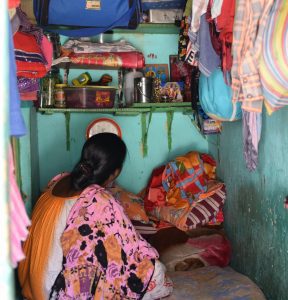
It is very easy to obtain an Aadhaar or a voter ID card if the sex workers are affiliated to an NGO working for their welfare, an activist working with sex workers in Kolkata told BehanBox on the condition of anonymity. “And, if not through NGOs, a Bangladeshi sex worker can easily bribe an Aadhaar operator to get a unique identity number issued. Another document that is perhaps the easiest to get is the PAN card,” the activist added.
For minors, fake birth certificates and school leaving certificates that are easy to obtain along the borders are being used to get original citizenship documents alongside the Indo-Bangladesh border, noted the study by the BSF and Justice and Care. The study also acknowledged the ease of securing an Aadhaar through touts.
BehanBox learnt from activists and experts working with the sex worker population of West Bengal that such cases are pretty common. “Trafficked women who engage in sex work often marry the local pimps or their clients and assume their surname. This further enables their access to identification documents,” said World Vision’s Wesley.
Many loopholes
Between 2017 and 2022, 2399 Bangladeshi nationals were intercepted and found using fraudulently obtained Indian documents at the Bureau of Immigration, as per data provided by the Ministry of Home Affairs in the parliament in July, 2022.
“Since returning permanently is not really an option, these women hope to visit Bangladesh on Indian passports,” said the activist, who did not wish to be named. Both Devi and Bibi have ration cards and Aadhaars, and plan to apply for an Indian passport.
While this route is one that is often taken by many Bangladeshi immigrants, it is not one without legal consequences. “These cases are certainly not an anomaly, but if these individuals were to be caught by the Indian authorities, they can certainly be booked for having made a false declaration,” said lawyer Gupta.
For undocumented Bangladeshi immigrants in India, especially trafficking survivors, using false documents to return to Bangladesh as Indian citizens and then applying for Bangladeshi citizenship once they find their family is hypothetically possible, said researcher Shahid. “As long as the person has an address in Bangladesh, they can apply for identification documents. This is possible largely because there is no way for the Bangladeshi authorities to confirm if the person holds an Indian citizenship. There is no bilateral detection system between the two countries so to speak,” she added.
Information gathered during her field work has shown, Shahid shared, that individuals can in many cases bribe Indian border security forces – as well as the Bangladeshi border guards – to return to their country of origin.
Violence and stigma
But homecoming can also be fraught. “In most cases, families of trafficked Bangladeshi women refuse to recognise them because of the patriarchal stigma surrounding girls who go missing – especially if the survivor has younger sisters,” said Gupta, who has fought several cases for trafficking survivors in West Bengal.
Bangladeshi women immigrants in India face violence and humiliation at every point. The violence begins on arrival itself at the hands of traffickers, law enforcement agencies and security forces, says Rimple Mehta, lecturer at the School of Social Sciences, Western Sydney University, in her extensively researched book Women, Mobility and Incarceration: Love and Recasting of Self across the Bangladesh-India Border. Those who refused to be exploited in brothels are often punished by being handed over to the police, she notes.
“Once arrested, various forms of violence, especially psychological violence, were to perpetrate their lives both in prison and in various other institutions of the criminal justice system in India,” writes Mehta.
*Names changed to protect identities.
We believe everyone deserves equal access to accurate news. Support from our readers enables us to keep our journalism open and free for everyone, all over the world.
